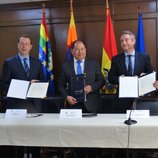 23 February 2018 - UNODC and the Government of Bolivia signed a Memorandum of Understanding (MOU), reiterating their commitment to combat transnational organized crime in international airports.
23 February 2018 - UNODC and the Government of Bolivia signed a Memorandum of Understanding (MOU), reiterating their commitment to combat transnational organized crime in international airports.
Supported by the International Organization of Criminal Police (INTERPOL) and the World Customs Organization (WCO), the agreement aims to implement the Airport Communications Project (AIRCOP) in Bolivia.
UNODC Representative in Bolivia, Thierry Rostan, said: "AIRCOP will provide the country with an important tool to deal with transnational organized crime in the area of drugs."
AIRCOP strengthens the detection, interdiction and investigation capabilities of security agents at participating airports, both in passenger and in air cargo, Mr. Rostan continued, adding that the project facilitates international cooperation while enabling information and intelligence exchange.
The project is expected to improve the control of illicit trafficking in controlled substances at the Viru Viru International Airport, the largest in Bolivia in terms of passenger flow (1,500 per day) and cargo transit (800 tons per month).
The airport will be connected to international police databases and communication systems provided by INTERPOL and WCO. These systems will facilitate the intelligence and information exchange in real time and safely with other international airports.
Participating in the signing ceremony were Minister for Government of Bolivia, Carlos Romero; Executive President of the National Customs, Marlene Ardaya; and Ambassador of the European Union, León de la Torre.
Bolivia is the tenth country in Latin America and the Caribbean to sign a Memorandum of Understanding with UNODC to implement AIRCOP, joining Argentina, Colombia, Brazil, Peru, El Salvador, Barbados, Jamaica, Panama and the Dominican Republic.
AIRCOP is funded by the European Union, Japan, Canada, Norway, and the United States. It is implemented by UNODC in partnership with WCO and INTERPOL.
Airport Communication Programme (AIRCOP)